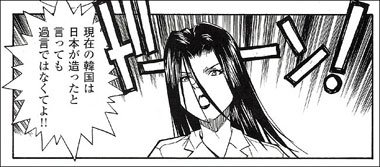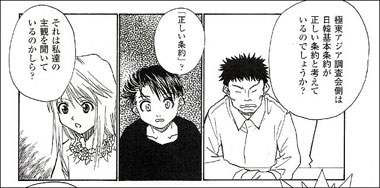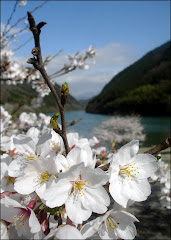
TOKYO - A young Japanese woman in the comic book "Hating the Korean Wave" exclaims, "It's not an exaggeration to say that Japan built the South Korea of today!" In another passage the book states that "there is nothing at all in Korean culture to be proud of."
In their graphic and unflattering drawings of Japan's fellow Asians and in the unapologetic, often offensive contents of their speech bubbles, the books reveal some of the sentiments underlying Japan's worsening relations with the rest of Asia.
They also point to Japan's longstanding unease with the rest of Asia and its own sense of identity, which is akin to Britain's apartness from the Continent. Much of Japan's history in the last century and a half has been guided by the goal of becoming more like the West and less like Asia. Today, China and South Korea's rise to challenge Japan's position as Asia's economic, diplomatic and cultural leader is inspiring renewed xenophobia against them here.
Kanji Nishio, a scholar of German literature, is honorary chairman of the Japanese Society for History Textbook Reform, the nationalist organization that has pushed to have references to the country's wartime atrocities eliminated from junior high school textbooks.
Mr. Nishio is blunt about how Japan should deal with its neighbors, saying nothing has changed since 1885, when one of modern Japan's most influential intellectuals, Yukichi Fukuzawa, said Japan should emulate the advanced nations of the West and leave Asia by dissociating itself from its backward neighbors, especially China and Korea.
"I wonder why they haven't grown up at all," Mr. Nishio said. "They don't change. I wonder why China and Korea haven't learned anything."
Mr. Nishio, who wrote a chapter in the comic book about South Korea, said Japan should try to cut itself off from China and South Korea, as Fukuzawa advocated. "Currently we cannot ignore South Korea and China," Mr. Nishio said. "Economically, it's difficult. But in our hearts, psychologically, we should remain composed and keep that attitude."
The reality that South Korea had emerged as a rival hit many Japanese with full force in 2002, when the countries were co-hosts of soccer's World Cup and South Korea advanced further than Japan. At the same time, the so-called Korean Wave - television dramas, movies and music from South Korea - swept Japan and the rest of Asia, often displacing Japanese pop cultural exports.
The wave, though popular among Japanese women, gave rise to a countermovement, especially on the Internet. Sharin Yamano, the young cartoonist behind "Hating the Korean Wave," began his strip on his own Web site then.
As nationalists and revisionists have come to dominate the public debate in Japan, figures advocating an honest view of history are being silenced, said Yutaka Yoshida, a historian at Hitotsubashi University here. Mr. Yoshida said the growing movement to deny history, like the Rape of Nanjing, was a sort of "religion" for an increasingly insecure nation.
"Lacking confidence, they need a story of healing," Mr. Yoshida said. "Even if we say that story is different from facts, it doesn't mean anything to them."
The Korea book's cartoonist, who is working on a sequel, has turned down interview requests. The book centers on a Japanese teenager, Kaname, who attains a "correct" understanding of Korea. It begins with a chapter on how South Korea's soccer team supposedly cheated to advance in the 2002 Word Cup; later chapters show how Kaname realizes that South Korea owes its current success to Japanese colonialism.
"It is Japan who made it possible for Koreans to join the ranks of major nations, not themselves," Mr. Nishio said of colonial Korea.
 The characters on the left and in the middle are supposed to be Japanese, while the character on the right is not.
The characters on the left and in the middle are supposed to be Japanese, while the character on the right is not.
But the comic book, perhaps inadvertently, also betrays Japan's conflicted identity, its longstanding feelings of superiority toward Asia and of inferiority toward the West. The Japanese characters in the book are drawn with big eyes, blond hair and Caucasian features; the Koreans are drawn with black hair, narrow eyes and very Asian features.
That peculiar aesthetic, so entrenched in pop culture that most Japanese are unaware of it, has its roots in the Meiji Restoration of the late 19th century, when Japanese leaders decided that the best way to stop Western imperialists from reaching here was to emulate them.
In 1885, Fukuzawa - who is revered to this day as the intellectual father of modern Japan and adorns the 10,000 yen bill (the rough equivalent of a $100 bill) - wrote "Leaving Asia," the essay that many scholars believe provided the intellectual underpinning of Japan's subsequent invasion and colonization of Asian nations.
Fukuzawa bemoaned the fact that Japan's neighbors were hopelessly backward. Writing that "those with bad companions cannot avoid bad reputations," Fukuzawa said Japan should depart from Asia and "cast our lot with the civilized countries of the West." He wrote of Japan's Asian neighbors, "We should deal with them exactly as the Westerners do."
As those sentiments took root, the Japanese began acquiring Caucasian features in popular drawing. The biggest change occurred during the Russo-Japanese War of 1904 to 1905, when drawings of the war showed Japanese standing taller than Russians, with straight noses and other features that made them look more European than their European enemies. " The Japanese had to look more handsome than the enemy," said Mr. Nagayama...
By Norimitsu Onishi (The New York Times)Updated: 2005-11-21




5 comments:
The nationalist propaganda is outrageous. The Japanese feel superior to the Koreans, the Koreans feel superior to the Japanese, and the Chinese feel superior to them both. But re-writing history isn't a good step at all.
Hello Melissa!
I just LOVE you entries to your blog! I look forward to seeing a new one and check everyday! :)
I just noticed that you commented on my Blog! *bows* I am so honored! Thank you so much for stopping by and leaving a comment! Yes, I did draw the Geisha that is my avatar. :) I draw geisha an *awful* lot, they're so beautiful and elegant. I just adore them!
Thank you so much again! Ja ne! :)
Cheers for putting this article on your blog, it's really insightful and explains the current political stand-off between Japan & its two neighbours quite well. Fascinating -and disturbing!- stuff :-).
When Andrew posted about this on gifujets in November, someone else posted the following link:
http://toron.pepper.jp/jp/syndrome/nation/fuckj.html
And the cycle of hate continues...
The Korea's anti-japan:
http://www.occidentalism.org/?cat=2&paged=2
Post a Comment